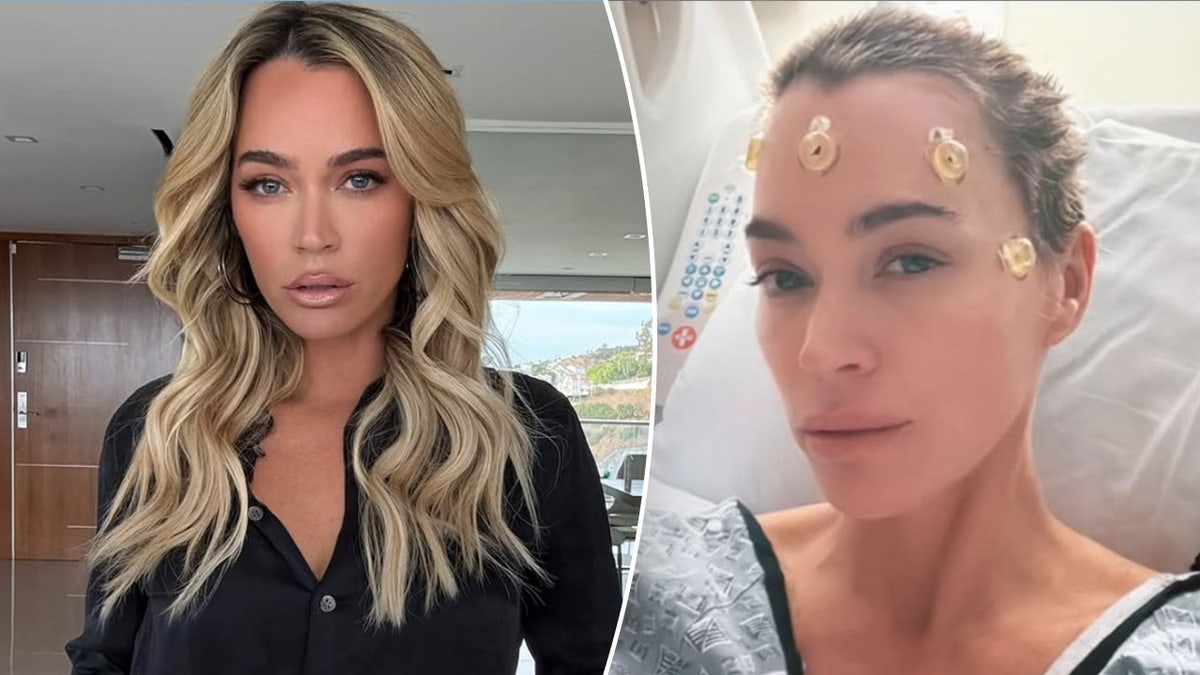Teddi Mellencamp is using her platform to share a crucial message about health advocacy after her melanoma progressed to stage 4 despite regular medical checkups. The 44-year-old former Real Housewives of Beverly Hills star opened up about her ongoing battle with metastatic melanoma in a revealing interview that highlights how even diligent patients can fall through the cracks of the healthcare system.

In a candid conversation with Glamour, conducted by her close friend Kyle Richards, Mellencamp shared the shocking details of how her cancer spread to her brain and lungs without being detected during routine appointments.
The reality star’s journey began in 2022 when she was first diagnosed with melanoma. Over the following years, she underwent 17 surgeries to remove various spots. Mellencamp believed she was staying on top of her health through consistent medical monitoring. However, in April 2024, she received devastating news. Her cancer had progressed to stage 4, having metastasized to her brain and lungs.
“When you go to a doctor, you just assume that’s it. I’m doing what I’m supposed to do,” Mellencamp explained. “At first, I didn’t even really do the research on melanoma because I didn’t want to know all of the bad things. But there’s a difference between self-diagnosing yourself and being an advocate for your own health.”
The podcast host revealed that despite her diligent approach to medical care, doctors never performed crucial scans. The medical team made this decision because her highest melanoma reading was only stage one. “I never really thought about it because I was like, ‘I go to a doctor every three months. Why wouldn’t they get me checked?’ My highest melanoma on my shoulder was stage one. When I finally followed up on it, they were like, ‘We didn’t do the scans, because you didn’t have anything above a stage one on your body.’ But look what happened.”
When Routine Care Isn’t Enough
Mellencamp’s story highlights a critical gap in cancer monitoring that many patients may not be aware of. Richards witnessed her friend’s situation firsthand. She shared an important point during their interview about the importance of patients requesting specific testing when necessary.
“I’d say if you have that much melanoma, and it’s that aggressive, ask for a brain and lung scan or places where it could have spread. That wasn’t ever brought up to you,” Richards noted during their conversation. “You were walking around with eight tumors in your brain, four of them the size of plums.”
The discovery of these tumors led to emergency brain surgery, followed by radiation and immunotherapy treatments. Mellencamp has maintained a remarkably positive outlook throughout her treatment. She attributes this to her determination to keep showing up for her life and her family.
“Something inside me told me, ‘You’re going to survive. You’re going to make it through this,'” she shared. “Of course I have days where I feel doubt and feel worried, but I just told myself to keep showing up.”
Her past experiences with mental health challenges have shaped Mellencamp’s approach to her diagnosis. Having dealt with anxiety and depression, she particularly focused on maintaining her psychological well-being throughout her cancer treatment.
“I’ve always struggled with anxiety, and I can get depressed. So I was always concerned with making sure that my mental health was as good as possible,” she explained. “I would make sure on the days that I felt good, I accomplished the things that I knew would give me more strength.”
Essential Advice for Future Patients
Beyond sharing her personal experience, Mellencamp has become a vocal advocate for practical healthcare preparation and patient empowerment. Her recommendations extend beyond medical advocacy to include financial planning that many people overlook until it’s too late.
“Something I really want to drive home is, get your life insurance before you’re sick. I can’t get it now,” she said. “I always thought, I’ll do it when I’m older, and then never did. I couldn’t get it back in the days when I only had melanoma on my shoulder.”
The importance of having a strong support system has also become clear through her journey. Richards and other close friends have created a group chat to help track Mellencamp’s medical information, appointments, and medications because the complexity of cancer treatment can be overwhelming for patients to manage alone.
“It takes a team of people. We literally have a group chat to keep track of everything, because we knew you wouldn’t be able to remember, especially in the beginning of all this,” Richards explained during their conversation.
Mellencamp stressed that patients shouldn’t be afraid to conduct their own research, but should avoid self-diagnosis.
“Trust your gut instinct. There was a long time that I wasn’t feeling well and didn’t go to the doctor. I thought I had migraines, I thought I was going through menopause. I had self-diagnosed myself with 500 things. And then one day, I couldn’t stand up,” she recounted.
The former Bravo star has also found therapeutic value in sharing her journey publicly, both through social media and her podcast. She has been open about various aspects of her treatment, including her decision to wear wigs and her ongoing efforts to maintain normalcy in her daily life.
Currently, Mellencamp continues her treatment while focusing on quality time with her children and maintaining activities that bring her joy. She has found that simple pleasures, such as swimming and taking walks in fresh air, have become essential parts of her healing routine.
“For whatever reason, being in water and being able to have fresh air have been two major things,” she shared, encouraging others to find small daily practices that support their well-being during difficult times.
-1750953820-q80.webp)


